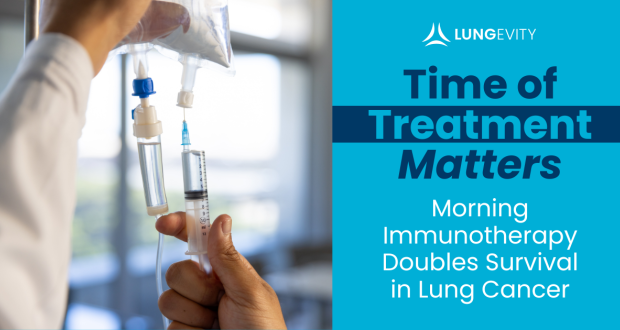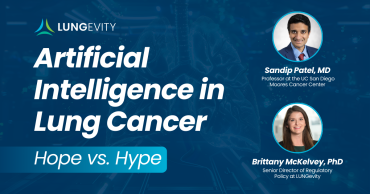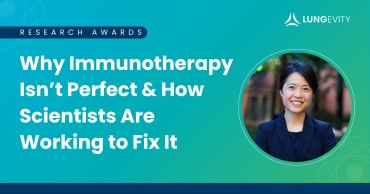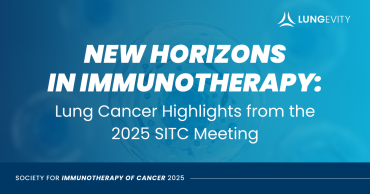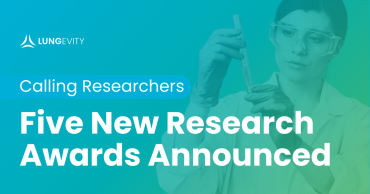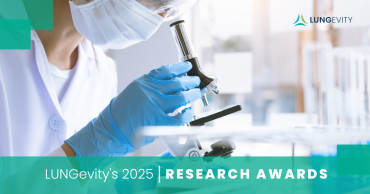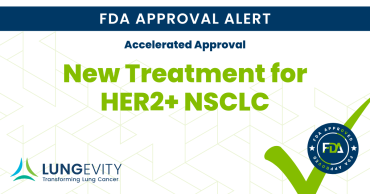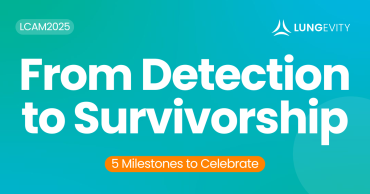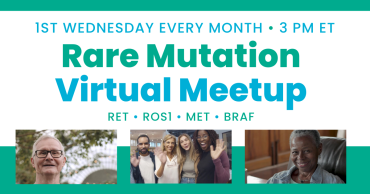-
Time of Treatment Matters: Morning Immunotherapy Doubles Survival in Lung Cancer
What if the time of day you receive cancer treatment matters as much as the treatment itself? New research from China, published in the prestigious scientific journal Nature Medicine, suggests it...
IN THE SPOTLIGHT
-
Artificial Intelligence in Lung Cancer: Hope vs. Hype
Artificial intelligence (AI) is rapidly reshaping the future of cancer care, but such dramatic innovation also brings important questions. AI has evolved from early consumer tools... -
Why Immunotherapy Isn’t Perfect & How Scientists Are Working to Fix It
The human immune system is an intricate web of checks and balances that usually excels at detecting and destroying foreign invaders, such as bacteria and viruses, while protecting... -
New Horizons in Immunotherapy: Lung Cancer Highlights from the 2025 SITC Meeting
The Society for Immunotherapy of Cancer (SITC) celebrated their 40th anniversary at their annual meeting in National Harbor, Maryland from November 5-9, 2025. The meeting focused... -
Biggest News from Berlin: Research Highlights from ESMO
Lung cancer research was in the spotlight at the European Society for Medical Oncology (ESMO) meeting held October 17-21, 2025, in Berlin, Germany. With approximately 30,000... -
The Future of Lung Cancer Starts Here
For more than two decades, LUNGevity Foundation has been a leader in advancing lung cancer research. Since 2002, we have invested $55+ million in more than 200 research projects... -
LUNGevity Foundation Invests $1.2 Million to Fuel Next Generation of Lung Cancer Research
LUNGevity Foundation announced $1.2 million in research awards that are designed to strengthen the lung cancer workforce and accelerate progress across the lung cancer continuum... -
New Accelerated Approval for HER2-positive NSCLC
On November 19, 2025, the US Food and Drug Administration (FDA) announced the accelerated approval of sevabertinib (Hyrnuo®) to treat patients with locally-advanced or metastatic... -
Celebrating Progress in Lung Cancer: From Detection to Survivorship
Over the past twenty years, lung cancer research and care have entered a new era. One filled with hope, innovation, and progress that is transforming what it means to face a lung... -
Rare Mutations (RET, ROS1, MET, BRAF) Virtual Meetup
Rare Mutation (RET, ROS1, MET, BRAF) patients/survivors - Join us the 1st Wednesday of every month to c onnect with others who share common experiences and build your community...
Time of Treatment Matters: Morning Immunotherapy Doubles Survival in Lung Cancer
Time of Treatment Matters: Morning Immunotherapy Doubles Survival in Lung Cancer
What if the time of day you receive cancer treatment matters as much as the treatment itself? New research from China, published in the prestigious scientific journal Nature Medicine, suggests it might. People with lung cancer who received immunotherapy in the morning lived significantly longer than those treated in the afternoon. Immunotherapy, given alone or combined with chemotherapy, is already an approved treatment for non-small cell lung cancer (NSCLC) without driver mutations. This…
Artificial Intelligence in Lung Cancer: Hope vs. Hype
Artificial Intelligence in Lung Cancer: Hope vs. Hype
Artificial intelligence (AI) is rapidly reshaping the future of cancer care, but such dramatic innovation also brings important questions.AI has evolved from early consumer tools (like autocorrect on phones, customer service chatbots, and personalized shopping recommendations) to advanced systems with the potential to revolutionize biomedical discovery and patient care. While there is tremendous excitement around AI, there is also a critical need to use it responsibly.Researchers are actively…
Why Immunotherapy Isn’t Perfect & How Scientists Are Working to Fix It
Why Immunotherapy Isn’t Perfect & How Scientists Are Working to Fix It
The human immune system is an intricate web of checks and balances that usually excels at detecting and destroying foreign invaders, such as bacteria and viruses, while protecting healthy tissue. But sometimes, the checks and balances get confused and stop the immune system from doing what’s right—such as killing tumor cells. Tumor cells are good at confusing the immune system because they originate from our healthy cells. They can often avoid detection by immune cells. Through several…
New Horizons in Immunotherapy: Lung Cancer Highlights from the 2025 SITC Meeting
New Horizons in Immunotherapy: Lung Cancer Highlights from the 2025 SITC Meeting
The Society for Immunotherapy of Cancer (SITC) celebrated their 40th anniversary at their annual meeting in National Harbor, Maryland from November 5-9, 2025. The meeting focused on multidisciplinary research aiming to leverage the immune system to improve outcomes for cancer patients, including several exciting areas of growth in lung cancer-directed immunotherapy.Tumor Imaging is Growing More Powerful Advanced imaging techniques are poised to change how we understand and treat…
The Future of Lung Cancer Starts Here
The Future of Lung Cancer Starts Here
For more than two decades, LUNGevity Foundation has been a leader in advancing lung cancer research. Since 2002, we have invested $55+ million in more than 200 research projects, helping to build a robust pipeline of discoveries in early detection, treatment innovation, and health equity.Once again, LUNGevity is ready to open our annual grant cycle in 2026 with five research programs designed to address the most pressing challenges in lung cancer care. In addition, these grants ensure the…
Biggest News from Berlin: Research Highlights from ESMO
Biggest News from Berlin: Research Highlights from ESMO
Lung cancer research was in the spotlight at the European Society for Medical Oncology (ESMO) meeting held October 17-21, 2025, in Berlin, Germany. With approximately 30,000 attendees from over 100 countries, this meeting gathered an international audience of clinicians, researchers, patient advocates, and representatives from the healthcare industry to discuss cutting-edge cancer research and share practice-changing clinical trial data. We saw data from studies that aim to build upon…
LUNGevity Foundation Invests $1.2 Million to Fuel Next Generation of Lung Cancer Research
LUNGevity Foundation Invests $1.2 Million to Fuel Next Generation of Lung Cancer Research
LUNGevity Foundation announced $1.2 million in research awards that are designed to strengthen the lung cancer workforce and accelerate progress across the lung cancer continuum—from early detection to treating advanced disease.“Today’s research is tomorrow’s cure. If we want to see continued breakthroughs and advancements in lung cancer, we must secure a strong pipeline of researchers dedicated to improving outcomes for people with lung cancer,” said Upal Basu Roy, PhD, MPH, Executive Director…
Celebrating Progress in Lung Cancer: From Detection to Survivorship
Celebrating Progress in Lung Cancer: From Detection to Survivorship
Over the past twenty years, lung cancer research and care have entered a new era. One filled with hope, innovation, and progress that is transforming what it means to face a lung cancer diagnosis. From groundbreaking early detection efforts to life-extending treatments, each step forward represents years of collaboration between researchers, patients, and others in the lung cancer community.Today, LUNGevity celebrates five exciting areas of progress that highlight the incredible strides made…
Researcher Goes Against the Grain: Brings New Hope for Patients with BRAF Fusions
Researcher Goes Against the Grain: Brings New Hope for Patients with BRAF Fusions
BRAF is an important signaling protein that regulates how normal cells grow and multiply through the MAPK (mitogen activated protein kinase) signaling pathway. However, changes in the BRAF gene can cause the cells to grow unchecked and develop into a tumor. This can lead to many types of cancer, including melanoma, colorectal, thyroid, and lung cancers. Researchers estimate that 4%-15% of tumors, from all types of cancer, are driven by changes in the BRAF gene. In lung cancer…
New Insights in Treating Metastatic Lung Cancer from WCLC 2025
New Insights in Treating Metastatic Lung Cancer from WCLC 2025
For people with advanced or metastatic non-small cell lung cancer (NSCLC), the treatment landscape has changed dramatically in recent years. Researchers are learning how to optimize existing therapies and are exploring entirely new treatment approaches. At the 2025 World Conference on Lung Cancer (WCLC), several studies highlighted progress in treating newly diagnosed individuals as well as those who need new options after standard therapies stop working. Combining Chemotherapy and…
Why Do Some People Who Have Never Smoked Get Lung Cancer?
Why Do Some People Who Have Never Smoked Get Lung Cancer?
As tobacco use has declined in recent years, we have seen a new demographic of lung cancer patients emerge. Lung cancer in individuals who have never smoked (LCINS) is becoming more common. These people are often younger women with no history of tobacco exposure.Researchers are working to understand the needs of this growing population by identifying other risk factors for lung cancer, such as family history and environmental exposures. They are also studying the molecular underpinnings of this…
The Promise of PROTACs for Treating RET+ Lung Cancer
The Promise of PROTACs for Treating RET+ Lung Cancer
RET proteins are a type of receptor tyrosine kinase—an important group of signaling molecules in healthy cells. When RET proteins are turned “on” and “off” in healthy cells, they control the function of other proteins. This cascading effect allows the cells to manage important cellular functions such as cell growth through protein signaling pathways. When specific changes (such as mutations or fusions) occur in RET proteins, they can become hyperactive, disrupting many important…
Conversations that Count: Transforming Lung Cancer Care Through Insight and Innovation
Conversations that Count: Transforming Lung Cancer Care Through Insight and Innovation
The LUNGevity Conversations that Count speaker series offers an opportunity to stay informed, engage in critical discussions, and learn from top experts revolutionizing lung cancer care for underserved populations. The series is intended for healthcare professionals, community health equity champions, and anyone interested in equitable access to healthcare. In February, we welcomed Randi Williams, PhD, MPH, of the Lombardi Comprehensive Cancer Center at Georgetown University Medical Center…
RET-Positive Lung Cancer: New Treatments and Beyond
RET-Positive Lung Cancer: New Treatments and Beyond
The four-person panel, including John Heymach, MD, PhD, from MD Anderson Cancer Center, discuss the current FDA-approved targeted treatments for RET-positive lung cancer—selpercatinib (Retevmo) and pralsetinib (Gavreto). While these first-line treatments have proven helpful in treating RET-positive non-small cell lung cancer, the cancer cells can eventually become resistant to the treatment, which is guiding much of Dr. Heymach’s attention at the moment.Watch the full video to hear about:Dr.…
Real-World Examples of Patient Involvement in Designing Clinical Trials
Real-World Examples of Patient Involvement in Designing Clinical Trials
Read time: 2 minutes.Here we present the final video in our three-part series about how patients and researchers can work together to develop clinical trials. In the video below, LUNGevity again partnered with Rising Tide for Clinical Cancer Research to illustrate the power of having patients contribute to the research process. We use a real-world example to learn about patient-researcher collaborations through the POSITIVE study, a breast cancer-focused clinical trial. You can…
Developing Clinical Trials that Account for the Realities of Patient Life
Developing Clinical Trials that Account for the Realities of Patient Life
Read time: 2 minutes. We are pleased to continue our three-part series about how patients and researchers can work together to develop clinical trials. In this second video, LUNGevity again partnered with Rising Tide for Clinical Cancer Research to show how researchers and patient advocates can be empowered with tools to create clinical trials that resonate with patients and address the key issues they care about. If you missed the first video, How Can Patients…
The 5 Most Popular Lung Cancer Blogs From 2024
The 5 Most Popular Lung Cancer Blogs From 2024
Read time: 3 minutes. Throughout 2024 we published blogs sharing scientific meeting recaps, educational content, personal stories, treatment news, and so much more. Below are the most popular articles we published in 2024. If you’re looking for survivor features and personal stories, you can see all the lung cancer survivors we highlighted in 2024 right here. 2024 ASCO: Highlights of Lung Cancer Research In June, we recapped the annual American Society of…
Research Milestones: Celebrating LUNGevity’s 2024 Research Awards
Research Milestones: Celebrating LUNGevity’s 2024 Research Awards
LUNGevity had a tremendous year supporting impactful research in 2024. In addition to our existing portfolio of ongoing research grants, we issued several new research awards in 2024. All of these awards are in strategic areas of research that are likely to move the dial for people living with lung cancer today and those who will be diagnosed in the future. Below are more details about the research projects we recently announced funding for. LUNGevity Supports 10 New Research…
Celebrating 20 Years of Progress in Lung Cancer Research and Treatment
Celebrating 20 Years of Progress in Lung Cancer Research and Treatment
Read time: 5 minutes.This year marks 20 years since researchers made a key discovery that changed the face of lung cancer research and treatment. By uncovering EGFR’s role in lung cancer, researchers developed a new class of drugs—targeted therapies—designed to target specific mutations in lung cancer cells while leaving healthy cells unharmed. As we’ve welcomed this era of precision medicine, we’ve also benefited from other treatment progress in lung cancer—including the development…
Screening and Early Detection of Lung Cancer: Highlights from WCLC and ESMO 2024
Screening and Early Detection of Lung Cancer: Highlights from WCLC and ESMO 2024
Lung cancer screening and early detection were major topics of discussion at the World Conference on Lung Cancer (WCLC), held in San Diego from September 7-10, and the European Society for Medical Oncology (ESMO) conference in Barcelona from September 13-17. This fourth and final blog in our series of updates summarizes highlights from these discussions. You can read the other update blogs from these fall science meetings: Metastatic NSCLC Highlights Small Cell Lung Cancer…
How Do Drugs Get Approved (and Fast-Tracked) by the FDA?
How Do Drugs Get Approved (and Fast-Tracked) by the FDA?
Read time: 5 minutes. This is Part 3 in our series on how drugs get approved to treat lung cancer. Part 1: Understanding Clinical Trials - Why Are They Important for Drug Development? Part 2: How We Define Success for a Clinical Trial The United States federal government aims to regulate prescription drugs to ensure people are receiving medication that’s safe and effective. Every prescribed drug in the U.S. has gone through a rigorous testing process that can…
How We Define Success for a Clinical Trial
How We Define Success for a Clinical Trial
Read time: 6 minutes. This is Part 2 of 3 in our series on how drugs get approved to treat lung cancer. Make sure to read Part 1 on the phases of clinical trials and why they are important for new drug development. We all want a treatment for lung cancer that is completely safe and entirely effective. While researchers are working toward that goal, the reality is we aren’t there yet. Every treatment we are considering comes with potential benefits and side effects. The…
Understanding Clinical Trials: Why Are They Important for Drug Development?
Understanding Clinical Trials: Why Are They Important for Drug Development?
Read time: 3 minutes.This is Part 1 in a 3-part series explaining how new drugs and treatments get approved to treat lung cancer. Parts 2 and 3 will be published in the coming weeks.Have you ever wondered how a new medicine or drug to treat lung cancer is brought to the people who need it? That’s what clinical trials help us do.According to the National Cancer Institute, a clinical trial is a type of research study that tests how well new medical approaches (such as screening tests, prevention…
Countdown to ILCSC24: Bringing the World’s Experts Right to Your Living Room
Countdown to ILCSC24: Bringing the World’s Experts Right to Your Living Room
Read time: 3 minutes. One of LUNGevity’s two flagship survivorship events, the International Lung Cancer Survivorship Conference (ILCSC), is being held virtually September 20 – 21, 2024. This is a free, online event that allows people with lung cancer and caregivers from around the world to join from the comfort of their own homes and hear from a star-studded lineup of lung cancer experts discussing the latest advances in research and treatment. You can register today for…
How Can Patients and Researchers Design Clinical Trials Together?
How Can Patients and Researchers Design Clinical Trials Together?
Read time: 2 minutes. Traditionally, people associate getting involved in lung cancer research with enrolling in a clinical trial. But most don’t realize they can also partner with researchers behind the scenes and get involved in designing clinical trials. In the first of a three-part series, Rising Tide Foundation for Clinical Cancer Research has partnered with LUNGevity to understand the role people with lung cancer can play in developing clinical trials. Through panelist…
2024 ASCO: Highlights of Lung Cancer Research
2024 ASCO: Highlights of Lung Cancer Research
Read time: 8 minutesThousands of oncologists, scientists, biotech and pharmaceutical representatives, patients, and advocates (including LUNGevity staff) met to discuss lifesaving cancer research at the annual meeting of the American Society of Clinical Oncology (ASCO) in Chicago from May 31 through June 4, 2024. The theme for this year’s conference, “The Art and Science of Cancer Care: From Comfort to Cure,” highlighted the importance of using both our creativity and our scientific…
Is Lung Cancer in Young Adults Hereditary?
Is Lung Cancer in Young Adults Hereditary?
Read time: 2 minutesThe question of whether lung cancer is hereditary is becoming increasingly important in the lung cancer community. While the average age of lung cancer diagnosis is approximately 70 years old, we are now seeing young adults in their 20s and 30s getting lung cancer.We currently suspect lung cancer in young adults may be caused by environmental factors (such as air pollution or chemical exposure), their genetic make-up, or some combination of these factors.We cannot say for…
Researcher Aims to Bring 360-Degree Care to Young Adults Living with Lung Cancer
Researcher Aims to Bring 360-Degree Care to Young Adults Living with Lung Cancer
Young adults (less than 50 years of age) are being diagnosed with lung cancer at increasing rates. They tend to be women of Hispanic or Asian descent and are typically diagnosed with advanced-stage lung cancer. Research is ongoing to help us develop effective options to treat these patients medically, but little is known about the effects of the diagnosis on their mental, social, and financial health or their family planning. To help us better understand the needs of this growing…
Kicking Drug Resistance to the Curb in RET-positive Lung Cancer
Kicking Drug Resistance to the Curb in RET-positive Lung Cancer
Read time: 4 minutes Lung cancers that test positive for the RET biomarker are often treated with targeted therapy. While this type of treatment has improved the duration and quality of life for many people living with lung cancer, we know that eventually these tumor cells develop drug resistance and begin to grow again. Researchers have been trying to understand what causes this drug resistance so we can develop treatment approaches to extend the time patients can effectively be treated…
Leveraging Basic Science to Stop Drug Resistance in RET+ Lung Cancer
Leveraging Basic Science to Stop Drug Resistance in RET+ Lung Cancer
Advances in targeted therapies have allowed us to treat some types of lung cancer with mutations in specific genes (for example, EGFR, KRAS, and RET). This has given some patients with lung cancer a better quality of life and longer survival. However, even after an initial response to the targeted therapy, lung tumors will eventually grow again. Research suggests this drug resistance is likely to involve drug-tolerant persister cells, or DTPCs—cells that tolerate the drug and persist after…

